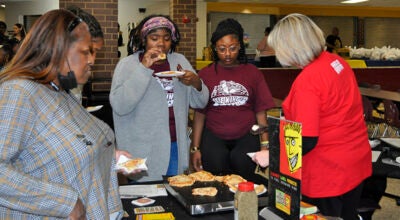Principals present math plans
Published 11:19 pm Thursday, November 8, 2012
A School Board meeting Wednesday assumed the air of a congressional committee hearing when board members quizzed principals on what they’re doing to lift math scores in Suffolk’s public high schools.
One after the other, King’s Fork’s Suzanne Rice, Lakeland’s Thomas Whitley and Nansemond River’s Thomas McLemore, from behind the “witness stand,” explained their math initiatives and answered questions.
This year, King’s Fork and Lakeland high schools both missed full accreditation after falling short of state benchmarks for math standardized test scores.
According to testimony at the meeting, held in King’s Fork High’s Black Box Theater — the intimate venue adding to the inquisition-like atmosphere — schools have introduced a range of strategies.
At King’s Fork, for instance, math teachers are receiving individualized professional development, more writing and vocabulary is being introduced into math lessons, and multi-step problems have been increased.
“We are always in need of additional math teachers,” Rice said. “It reduces the class sizes, and that’s always a benefit.”
Rice said a full-time math coach “would also be a great addition to the staff,” and she welcomed board member Linda Bouchard’s suggestion of having more student teachers rotate in and out of schools.
Lakeland now requires all math teachers to administer pre-assessments to highlight knowledge gaps, and to maintain teacher portfolios documenting progress toward “individual and instructional goals,” Whitley said.
Teachers have also been relinquishing planning blocks to “team teach” with colleagues, and new emphasis is being placed on ensuring students don’t just get answers right, but understand how they got the answer.
At the end of classes, students record on paper, which is submitted to the teacher, any concepts they don’t understand.
“It’s not enough, in my opinion, for a teacher to present a lesson, then to ask the magic question, ‘Are there any questions?’” Whitley said.
Lakeland has introduced student supports such as Fall Boot-Camp, after school on Mondays, Tuesdays and Wednesdays, and summer transition workshops exposing students to the more difficult math concepts they face in the next school year.
Nansemond River’s McLemore, whose school has achieved better results than the others, recounted interactive learning strategies where students, for example, dance and play charades, and various other initiatives.
“Our math teachers … take it very personally when our students don’t succeed,” he said. “That is their greatest strength.”
He said it’s getting “extremely difficult” to get students to complete homework, saying, “We feel very strongly that when they’re in the classrooms, that is the most important time to correct mistakes.”
The district will try to redirect funds to math remediation, Superintendent Deran Whitney said. “It’s not a matter of finding money, it’s a matter of taking it from somewhere else,” he said.






